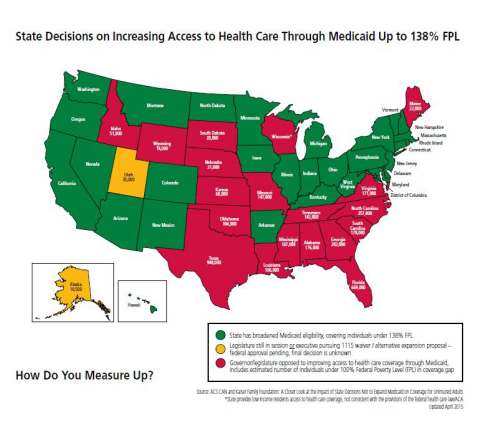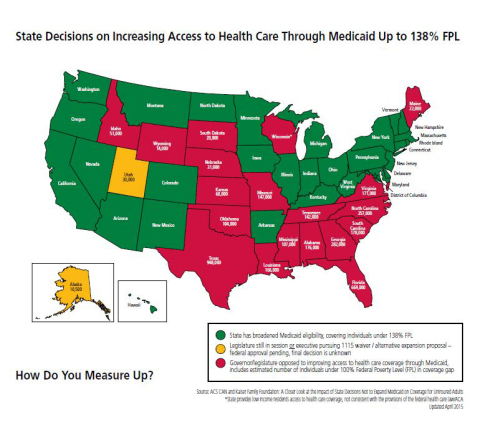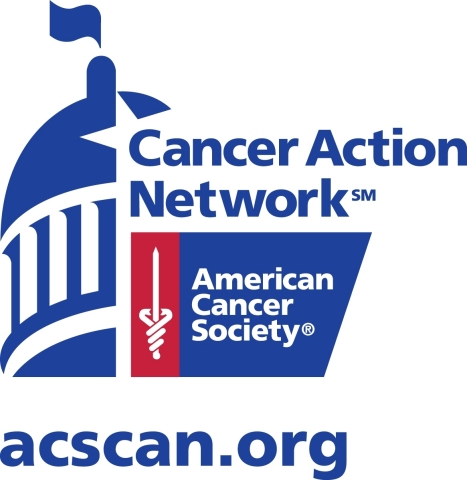ANCHORAGE, Alaska--(BUSINESS WIRE)--Alaska is falling behind when it comes to supporting policies and passing legislation to prevent and reduce suffering and death from cancer. According to the latest edition of How Do You Measure Up?: A Progress Report on State Legislative Activity to Reduce Cancer Incidence and Mortality, Alaska measured up to policy recommendations in two of the nine issue areas ranked. The report was released today by the American Cancer Society Cancer Action Network (ACS CAN).
“We’ve made tremendous progress in the way we diagnose and treat cancer across the country. But to leverage this progress, Alaska legislators must take advantage of the opportunities to pass evidence-based laws and policies that are proven to save lives and money,” said ACS CAN Alaska Government Relations Director Emily Nenon. “In Alaska alone in 2015, 3,700 people will be diagnosed with cancer and 1,000 will die from it. We can’t wait to take action when the stakes are that high. This report outlines ways lawmakers can make a difference by emphasizing cancer prevention, curbing tobacco use and prioritizing quality of life for patients and their families.”
How Do You Measure Up? rates states in nine specific areas of public policy that can help fight cancer, including smoke-free laws, tobacco tax levels, funding for tobacco prevention and cessation programs and cessation coverage under Medicaid, funding for cancer screening programs and restricting indoor tanning devices for minors. The report also looks at whether or not a state has said yes to federal funds available to increase access to care through its Medicaid program, has passed policies proven to increase patient quality of life and offers a well-balanced approach to pain medications.
Additionally, the report offers a blueprint for states to effectively implement provisions of the health care law in a way that benefits cancer patients and their families, and discusses the negative financial impact if Alaska fails to take action on cancer-fighting policy. Passing and implementing the policy recommendations in the report would not only save lives in Alaska, but also save millions in long-term health care costs and in some cases would even generate additional, much-needed revenue.
A color-coded system classifies how well a state is doing in each issue. Green shows that a state has adopted evidence-based policies and best practices; yellow indicates moderate movement toward the benchmark and red shows where states are falling short.
|
How Alaska Measures Up: FALLING BEHIND |
||
| Cigarette Tax Rates | GREEN | |
| Smoke-free Laws | RED | |
| Tobacco Prevention and Cessation Program Funding | GREEN | |
| Medicaid Coverage of Tobacco Cessation Services | YELLOW | |
| Indoor Tanning Device Restrictions | RED | |
| Increased Access to Medicaid | YELLOW | |
| Breast and Cervical Cancer Early Detection Funding | RED | |
| Access to Palliative Care | RED | |
| Pain Policy | YELLOW | |
Alaska’s progress on a statewide smoke-free workplace law is featured in the national report. The “Take It Outside Act” was introduced in 2015 by Senator Peter Micciche and is well positioned to pass in 2016. Backing for the measure keeps growing, with more than 875 businesses and organizations across the state signed on in support.
Tweet this: How is Alaska doing when it comes to making sure public places are #smokefree? Find out: www.acscan/org/measure.
Another category that is in the process of improving dramatically is increased access to Medicaid. Governor Bill Walker’s announcement last month he will increase access to health coverage for thousands more Alaska residents will save lives and long-term health care dollars in the state. Access to affordable, quality health insurance is critical to beating cancer.
Uninsured individuals are more likely than those with health insurance to be diagnosed with late-stage cancers, which are more difficult and costly to treat, and are more likely to die from the disease. By accepting the federal funds already set aside for Alaska to increase access to health coverage through its Medicaid program nearly 42,000 more Alaskans will now be able to see a doctor regularly, access recommended cancer screening tests and receive treatment if needed.
Once implemented, Alaska will be the 30th state, in addition to Washington, D.C., to accept the federal funds offered through the Affordable Care Act to increase access to health coverage through a state’s Medicaid program. ACS CAN will continue to work with lawmakers in the remaining states to ensure more individuals have access to the care they need.
ACS CAN, the nonprofit, nonpartisan advocacy affiliate of the American Cancer Society, supports evidence-based policy and legislative solutions designed to eliminate cancer as a major health problem. ACS CAN works to encourage elected officials and candidates to make cancer a top national priority. ACS CAN gives ordinary people extraordinary power to fight cancer with the training and tools they need to make their voices heard. For more information, visit www.acscan.org.




